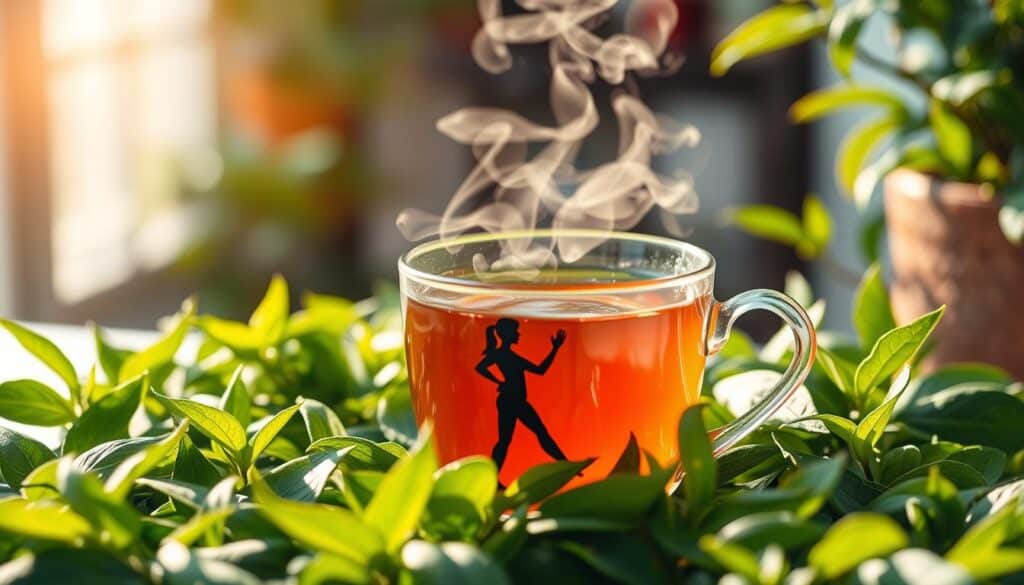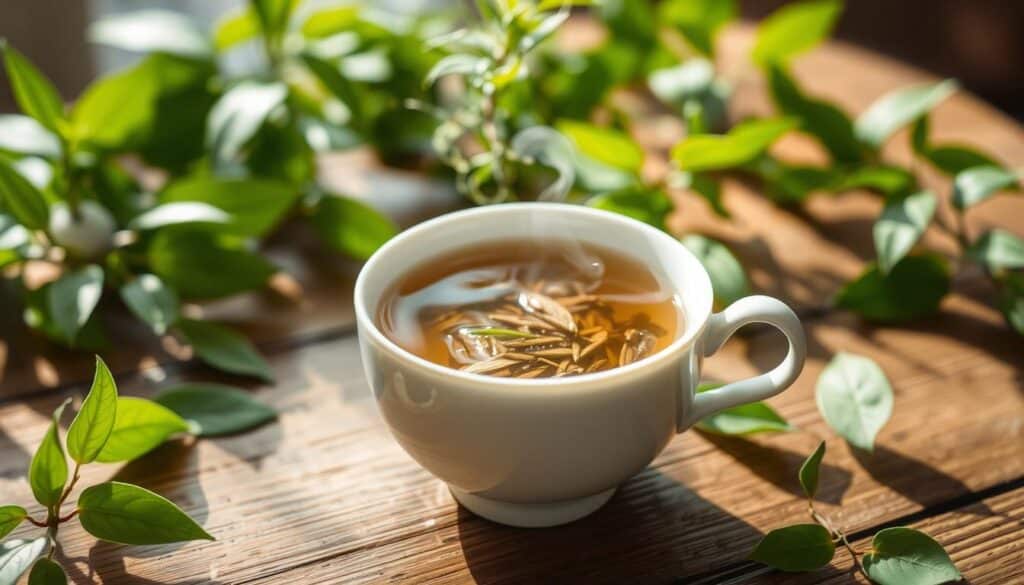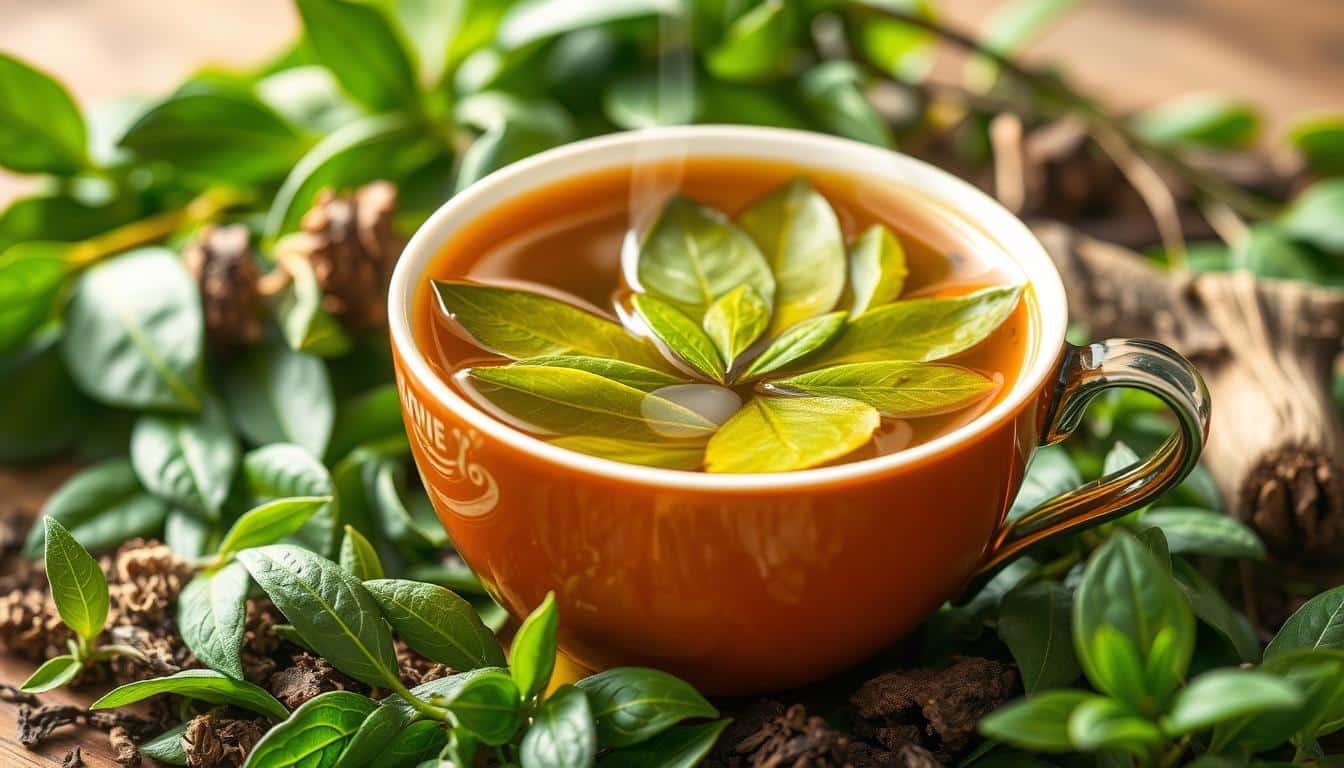Is Leaf tea good for you? If you’ve ever wondered about the incredible benefits of this age-old beverage, you’re in for a treat! Leaf tea, celebrated for its rich antioxidant content and centuries of tradition, offers a host of health benefits that support both mind and body. In this article, we’ll explore how leaf tea can boost your heart health, improve brain function, and even help you relax while answering your most pressing questions about its benefits.
Whether you savor your tea hot for a comforting ritual or iced for a refreshing pick-me-up, there’s much to discover about the power of leaf tea. Let’s dive into the details.
Understanding Different Types of Tea
The world of tea is vast and fascinating. It includes true teas, made from the Camellia sinensis plant, and herbal teas, or tisanes, made from herbs, flowers, and other plants.
True Teas (Camellia Sinensis)
True teas come from the Camellia sinensis plant. They include black, pu-erh, oolong, green, and white tea. Each type has its own flavor, aroma, and health benefits.
For example, black tea is strong and bold. Green tea is delicate and grassy.
Herbal Teas and Tisanes
Herbal teas, or tisanes, are made from herbs, flowers, fruits, and other plants. They offer many flavors and health benefits. You can enjoy them with food, like wine.
Processing Methods and Varieties
The way teas are processed shapes their final taste. Green tea leaves are withered and rolled gently. Black tea leaves are oxidized, making them robust.
Exploring different teas lets you find your favorites. You’ll discover the rich flavors of this ancient drink.
Is Leaf Tea Good for You?
Leaf tea is indeed good for you. It’s full of antioxidants and other good stuff. These help fight off bad free radicals and might lower the risk of chronic diseases. Plus, it’s great for your heart.
Loose-leaf tea is better than tea bags because it keeps more of these good compounds. The bigger leaves let more antioxidants like catechins and flavonoids get into your tea. This means your tea tastes better and might be healthier too.
Leaf tea also has L-theanine, which helps you relax and feel better. Loose-leaf tea usually has more L-theanine than tea bags. So, it’s a great choice for your daily tea.
“Loose-leaf tea is often considered the gold standard in tea quality, providing a more complex, nuanced, and richer taste than tea bags.”
Drinking loose-leaf tea is more than just a drink. It’s a way to connect with tea culture and enjoy a moment of calm. Plus, it comes in less packaging, which is better for the planet.
So, if you want to up your antioxidant game, feel better mentally, or just enjoy a tasty drink, leaf tea is perfect. It’s a healthy choice that can make you feel better and more balanced.
The Power of Antioxidants in Tea
Tea’s antioxidants are key to your health. They fight off free radicals, which can harm your cells and lead to diseases. This is thanks to the polyphenols in tea.
Polyphenols and Their Benefits
Tea is full of polyphenols like catechins and flavonoids. These are strong antioxidants. They protect your cells from damage and boost your health. Loose-leaf tea has more of these than bagged tea because it uses whole leaves.
Fighting Cell Damage and Inflammation
Drinking tea rich in antioxidants can help your heart and immune system. It fights oxidative stress and inflammation. These are big risks for heart disease, cancer, and Alzheimer’s.
Free Radical Protection
Free radicals can age your cells and cause health issues. Tea’s antioxidants neutralize these radicals. Drinking tea daily can help keep you healthy and strong.
“The antioxidants in tea are essential for maintaining a healthy, balanced lifestyle.”
Health Benefits of Black Tea
Black tea is a favorite drink for many. It’s not just tasty but also good for your health. It offers many benefits that make it special among teas.
One key benefit is its support for heart health. Studies show black tea can lower blood pressure and improve heart health. A 2020 review found drinking tea daily can lower heart disease risk by 4%.
Black tea’s heart benefits come from polyphenols, powerful antioxidants. These protect cells from damage and inflammation. A 2017 study found daily tea drinkers had an 8% lower heart disease risk.
Black tea also helps reduce stroke risk. A 2021 study showed drinking at least two cups a day lowers ischemic stroke risk.
Black tea’s benefits go beyond heart health. It may slow cancer growth, like oral cancer, as a 2020 review suggests.
While more research is needed, black tea is a great addition to a healthy lifestyle. It’s enjoyed hot or cold by many every day.
| Black Tea Properties | Black Tea Benefits |
|---|---|
|
|

“Drinking tea has been associated with a lower risk of heart disease and stroke, as well as a reduced risk of certain types of cancer.”
Green Tea’s Impact on Wellness
Green tea is known for its many health benefits. It helps with weight management and boosts brain function. It’s full of antioxidants and special compounds that make it a favorite among tea lovers.
Weight Management Properties
Green tea can speed up your metabolism, helping you manage your weight. Studies show that drinking two to four cups a day can lower stroke risk by up to 24%. Women who drank four cups a day had 44% less belly fat than men.
Cognitive Function Enhancement
Green tea contains L-theanine, which improves focus and relaxation. Drinking it often can lower the risk of memory loss by 64%. It’s a great choice for those wanting to keep their minds sharp.
Green tea has less caffeine than black tea but still gives a gentle energy boost. Its benefits for weight and brain health make it a key part of a healthy lifestyle.
“Drinking four or more cups of green tea daily lowers the risk of dying from Type 2 diabetes complications by up to 40%.”
Tea experts say green tea goes well with seafood and shellfish. It’s a tasty and healthy addition to any diet.
White Tea and Oolong Tea Properties
Oolong tea is a mix of green and black tea, with a unique taste. It has l-theanine, which can calm you down, help you sleep better, and make you think clearly.
| Tea Type | Caffeine Content | Antioxidant Level | Potential Health Benefits |
|---|---|---|---|
| White Tea | Relatively Low | High |
|
| Oolong Tea | Moderate | Moderate to High |
|
Whether you like the light taste of white tea or the mix of oolong tea, both are worth trying. Adding them to your daily routine can boost your health and taste.
“White tea was initially reserved for Chinese royalty during the Song Dynasty (960-1279), showcasing its prestigious history and potential health benefits.”
Herbal Tea Benefits for Sleep and Relaxation
Looking for a natural way to relax and sleep better? Herbal teas might be the answer. Caffeine-free teas like chamomile and lavender are known for their calming effects. Adding these teas to your evening routine can help you sleep better without the risks of some sleep aids.
Chamomile and Lavender Effects
Chamomile tea, like Bigelow Cozy Chamomile, is famous for its calming effects. Research shows it can relax you, aid digestion, and offer anti-inflammatory and antioxidant benefits. Lavender oil also helps improve sleep quality and duration when used as a supplement.
Natural Sleep Aid Properties
- Pukka Peace tea combines chamomile, lavender, spearmint, and ashwagandha to support sleep and relaxation.
- Pukka Night Time Berry tea uses elderberry, blackcurrant, and echinacea to boost the immune system. It also includes chamomile, lavender, and valerian root for sleepiness before bed.
- Lemon balm tea has been used for over 2,000 years to help with stress and anxiety. It can also ease depression and sleep issues by increasing GABA-T levels.
- Valerian root extract has been shown to improve sleep quality. Almost 90% of people reported better sleep after drinking valerian tea.
Adding these herbal teas to your evening routine can be a gentle way to relax and improve your sleep quality.
Tea’s Role in Heart Health
Drinking a warm cup of tea might do more than just calm your mind. It could also help your heart. Many studies show that green and black teas can improve heart health and lower heart disease risk.
The key is the antioxidants in true teas, like green and black. These compounds, called polyphenols, help lower blood pressure and improve cholesterol. They also reduce the risk of heart attacks and strokes.
A 2023 study found green tea can greatly improve heart health and blood pressure. In the UK, from 2006 to 2010, drinking 2 or more black tea cups daily lowered all-cause mortality. This included heart disease and stroke.
The antioxidants in tea protect the heart. They may reduce inflammation, improve blood vessel function, and stop LDL cholesterol oxidation. This prevents artery plaque buildup.
Adding more tea and heart health to your day is a simple heart health boost. Choose from black tea’s strong taste or green tea’s subtle flavors. Both offer cardiovascular benefits for a healthier lifestyle.

Safe Tea Consumption Guidelines
Tea is usually safe, but it’s best to drink it in moderation. There’s no one-size-fits-all rule for how much tea to drink each day. Yet, many experts say 2-3 cups a day can be good for your health.
Daily Recommended Intake
The right amount of tea for you can depend on several things. These include your age, health, and what you like. Still, most doctors suggest drinking 2-3 cups a day. This helps you get the benefits without too much caffeine or other stuff.
Quality and Safety Considerations
It’s key to think about safety when drinking tea. A study by Consumer Reports showed most teas are safe. But, it’s smart to buy tea from trusted brands to be sure.
Some people, like those with kidney stones or anemia, should be careful. This is because tea has oxalates and might affect iron levels. Always talk to a doctor about how much tea is safe for you.
| Nutrient | Amount per 8-ounce Cup |
|---|---|
| Calories | 2.4 |
| Protein | 0 grams |
| Fat | 0.5 grams |
| Carbohydrates | 0 grams |
| Fiber | 0 grams |
| Sugar | 0 grams |
| Caffeine (Black Tea) | 47 milligrams |
| Caffeine (Green Tea) | 28 milligrams |
Knowing how much tea to drink and choosing safe options can make your tea time better. Enjoy the health perks of tea while staying safe and happy.
Brewing Methods for Maximum Benefits
Getting the most out of your tea starts with the right brewing techniques. Whether you like loose-leaf or tea bags, knowing the best water temperature and steeping times is key. This can greatly enhance both the health benefits and flavors of your tea.
For green tea, use water that’s a bit cooler, around 175°F (79°C). Steep it for 2-3 minutes. This keeps the delicate flavors and antioxidants intact. On the other hand, black tea needs boiling water (212°F or 100°C) and a 3-5 minute steep. This allows the leaves to fully infuse and bring out their rich taste.
| Tea Type | Water Temperature | Steeping Time |
|---|---|---|
| Green Tea | 175°F (79°C) | 2-3 minutes |
| Black Tea | 212°F (100°C) | 3-5 minutes |
Loose-leaf tea has its perks over tea bags. The bigger leaves expand more, releasing more of the good stuff. This can lead to a more complex flavor and better health benefits. Plus, loose-leaf is often compostable, making it eco-friendly.
To brew loose-leaf tea, use a mug infuser or a teapot with a built-in filter. Pour hot water over the leaves, cover it to keep the heat in, and steep for the suggested time. Herbal teas usually need one teaspoon of leaves per eight ounces of water and a 5-10 minute steep, depending on the herb.
Whether you’re into loose-leaf or tea bags, learning how to brew tea well can bring out the best in your favorite brews. By focusing on the right water temperature and steeping time, you can make a cup of tea that’s not just tasty but also good for you.
Conclusion
The world of leaf tea is vast and diverse. It offers many health benefits and flavors to explore. True teas like black, green, and white are rich in antioxidants. Herbal tisanes are soothing and offer unique properties for wellness.
Whether you like the complex flavors of loose-leaf teas or the ease of tea bags, tea is beneficial. Loose-leaf teas keep more of their good stuff, like L-theanine for calm and antioxidants for health. Tea bags are easy to use and consistent.
Keep trying different teas, brewing methods, and flavors to find what you like. This way, you can enjoy all the benefits tea has to offer. You’ll live a healthier, more balanced life.
FAQ
What are the health benefits of drinking leaf tea?
Leaf tea has many health benefits. It may protect against heart attacks, type 2 diabetes, and cancer. It also helps fight off harmful free radicals, which can reduce the risk of chronic diseases and improve heart health.
What are the different types of true teas and their properties?
True teas include black, pu-erh, oolong, green, and white tea. They all come from the Camellia sinensis plant. Each type has its own unique flavors and health benefits. For example, black tea may support heart health, while green tea boosts metabolism.
What are the benefits of herbal teas and tisanes?
Herbal teas, or tisanes, are made from herbs and plants. They offer different flavors and health benefits. Some, like chamomile and lavender, help you relax and sleep better.
How do processing methods affect the properties of tea?
Processing methods change the flavor and properties of each tea. Loose-leaf tea contains more beneficial compounds than bagged tea. This means it often tastes richer and offers more health benefits.
What are the antioxidant benefits of drinking tea?
Tea is full of antioxidants, like catechins and flavonoids. These protect cells from damage by free radicals. They reduce inflammation and may lower the risk of chronic diseases.
What are the health benefits of black tea?
Black tea has many health benefits. It may support heart health by lowering blood pressure. This makes it good for the heart.
How does green tea benefit health and wellness?
Green tea is known for its wellness benefits. It helps with weight management and boosts metabolism. It also improves cognitive function with its L-theanine content.
What are the unique properties of white tea and oolong tea?
White tea has a delicate flavor and lots of antioxidants. Oolong tea offers a mix of green and black tea flavors. Both can improve overall wellness and offer a complex taste.
How can herbal teas help with sleep and relaxation?
Herbal teas like chamomile and lavender are calming. They can help you sleep better. Drinking them before bed is a natural way to relax.
How can tea consumption benefit heart health?
Drinking tea regularly may improve heart health. Green and black teas have compounds that lower blood pressure. This supports heart function.
What are the recommended guidelines for safe and healthy tea consumption?
Tea is safe in moderation. Experts say 2-3 cups a day is best for health benefits. Be aware of contaminants in some tea products, but they’re rare.
How can proper brewing techniques maximize the health benefits and flavor of tea?
Proper brewing techniques enhance tea’s health benefits and flavor. Use the right water temperature and steeping time for each tea. Choose loose-leaf tea for more flavor and health benefits than bagged tea.

